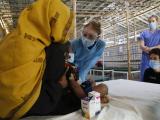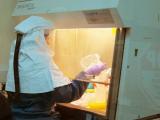Mar 19, 2013 (CIDRAP News) – A presidential bioethics commission asked to study whether anthrax vaccine trials should be conducted in children before an event occurs released its assessment today, spelling out several steps that would need to be taken before research could proceed.
The report from the Presidential Commission for the Study of Bioethical Issues also addresses the broader issue of the safety of other medical countermeasures (MCMs) in pediatric populations. It reviewed the issue after a 2012 request from Health and Human Services (HHS) Secretary Kathleen Sebelius.
Her request grew out of a federal bioterrorism exercise in 2011 called Dark Zephyr. Based on a large-scale release of anthrax spores in a large city such as San Francisco, it estimated that nearly a quarter of the 8 million casualties would be children but determined that widespread vaccination with anthrax vaccine adsorbed (AVA) would play a key role in protecting people against the long-term threat from Bacillus anthracis spores, which cause anthrax.
The exercise, however, highlighted that there was no information on the vaccine's safety in children.
In April 2011 Assistant Secretary for Preparedness and Response (ASPR) Nicole Lurie, MD, MPH, asked the National Biodefense Science Board (NBSB), a group that advises the federal government on biodefense countermeasure issues, to study the issue. In October of that year the NBSB approved a recommendation from its working group that the HHS develop a plan to study in advance of an attack the use of anthrax vaccine in children, contingent on a bioethics review.
Amy Gutmann, PhD, chair of the president's bioethics commission, said during a media telebriefing yesterday that the review posed difficult questions about balancing the need to protect children in an emergency setting with minimizing the risk to children when researching the safety and efficacy of AVA and other countermeasures.
"The safety of our children is paramount, and we have to get this precisely right," she said.
In its report the group made six recommendations detailing conditions that would need to be met before pre-event studies of anthrax vaccine and other MCMs could be conducted, Gutmann said.
The overarching principle is that children don't benefit directly from participating in the study in advance of an attack, so risk must be kept small—such as limiting the risk to those routinely faced in daily life or at a medical visit, she said. In contrast, post-event studies would benefit participants and provide an opportunity to learn about the condition in a real attack setting.
Pre-event trials shouldn't go forward without more modeling studies, animal studies, and testing in the youngest adults, the report said. The commission recommended an age de-escalation approach that would use data from an older age-group to guide the design of the next research study and risk assessment for the next youngest group.
She said that it's possible to move forward with some studies, such as one that would explore AVA in young adults, such as military recruits, who have already had the vaccine.
Gutmann, in a New England Journal of Medicine (NEJM) commentary today on the report, wrote that additional data from adult studies are needed, such as dose-sparing strategies, before pediatric testing can ethically be considered.
When a pre-event medical countermeasure trial would pose more than a minimal risk, it must go though a "national-level review" of experts. Gutmann said examples of minor risks would include, for example, a skin biopsy or a chest x-ray.
Christine Grady, RN, PhD, a commission member, told reporters that the panel would be convened by the HHS and would likely include experts in pediatrics and pediatrics research, as well as members of the general public.
For the post-event scenario, the commission strongly recommended that federal officials proceed with designing research protocols for untested or minimally tested MCMs that would be triggered by an attack or emergency.
The group also recommended that a plan be put in place to compensate victims from any harm that would come from the studies.
Biosecurity expert Michael Osterholm, PhD, MPH, said the question of whether to proceed with pre-event testing is a difficult one, with no perfect answer.
In the event of an attack and vaccines and antibiotics are deployed across a range of age-groups, he said the public might ask why medical authorities didn't have more information on countermeasure use in children. And if there's not an attack and the vaccine causes harm during studies, officials will face similarly tough questions.
Osterholm, director of the University of Minnesota's Center for Infectious Disease Research and Policy, publisher of CIDRAP News, said that what makes kids different is they can't give informed consent and that AVA—unlike other vaccines that are studied for known threats—have no immediate benefit.
One middle ground that most experts agree on is the need for protocols for research studies that would kick in as soon as an attack occurs and the countermeasures are deployed, Osterholm said.
The HHS's ASPR office said in an e-mail to CIDRAP News yesterday that the safety and security of the nations' children is a top priority. "We thank the Presidential Commission for the Study of Bioethical Issues for their thoughtful recommendations. We look forward to fully reviewing the report."
See also:
Mar 19 Presidential bioethics commission press release
Mar 19 Presidential bioethics commission report
Mar 19 NEJM commentary
Oct 28, 2011, CIDRAP News story "NBSB urges pre-attack studies of anthrax vaccine in kids"


















